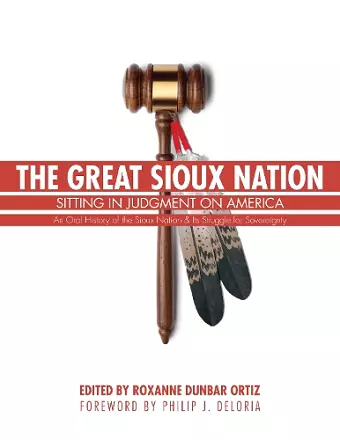The Great Sioux Nation
Sitting in Judgment on America
Format:Paperback
Publisher:University of Nebraska Press
Published:1st May '13
Currently unavailable, and unfortunately no date known when it will be back

The story of the Sioux Nation's fight to regain its land and sovereignty, highlighting the events of 1973-74
“If the moral issues raised by the Sioux people in the federal courtroom that cold month of December 1974 spark a recognition among the readers of a common destiny of humanity over and above the rules and regulations, the codes and statutes, and the power of the establishment to enforce its will, then the sacrifice of the Sioux people will not have been in vain.”—Vine Deloria Jr.
The Great Sioux Nation: Sitting in Judgment on America is the story of the Sioux Nation’s fight to regain its land and sovereignty, highlighting the events of 1973–74, including the protest at Wounded Knee. It features pieces by some of the most prominent scholars and Indian activists of the twentieth century, including Vine Deloria Jr., Simon Ortiz, Dennis Banks, Father Peter J. Powell, Russell Means, Raymond DeMallie, and Henry Crow Dog. It also features primary documents and firsthand accounts of the activists’ work and of the trial.
New to this Bison Books edition is a foreword by Philip J. Deloria and an introduction by Roxanne Dunbar Ortiz.
“A delightful part of this volume is the extensive use of oral history of the Sioux which gives their version and understanding of the treaty of 1868. This will undoubtedly be a valuable source of information for future use. . . . In addition, the insights presented by the several writers about the importance of oral traditions among the Indian tribes will be useful to historians.”—Veronica E. Tiller, Pacific Historical Review |“This book records what the Sioux people, the scholars, and the attorneys for the Sioux attempted to bring to the attention of the federal courts, the administration of that year, and the American people concerning the nature and status of the Sioux Nation. . . . If the moral issues raised by the Sioux people in the federal courtroom that cold month of December 1974 spark a recognition among the readers of a common destiny of humanity over and above the rules and regulations, the codes and statutes, and the power of the establishment to enforce its will, then the sacrifice of the Sioux people will not have been in vain.”—Vine Deloria Jr. |
“The oral history in this book represents some of the last documentation from the Lakota point of view, on the 1868 Fort Laramie Treaty in these modern times. Almost all of the individuals quoted in the book have passed on and their oral history was only one generation removed from the actual Treaty signers. The entire hearing in front of Judge Urbom was a turning point in U.S. Law, as this was one of the few times in history where Lakota interpreters were used in U.S. Federal Court to express the meaning of the Fort Laramie Treaty from Lakota Peoples to the Judge and the Federal Court. Another highlight in this historic book was turning the words of the late Henry Crow Dog into poetry which made his wisdom understandable to future researchers, Indian and non-Indian.”—Bill Means, Lakota, co-founder, International Indian Treaty Council
""The Great Sioux Nation transcends its time and place and speaks to the present as much as the past.""—Amanda Lynch Morris, Journal of American Culture
ISBN: 9780803244832
Dimensions: unknown
Weight: unknown
232 pages